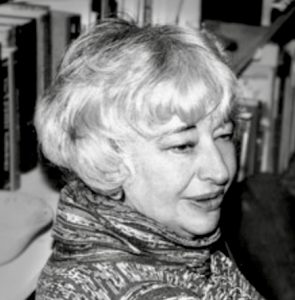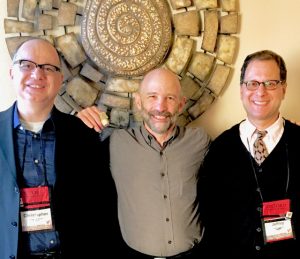Florence Tyson: Music Therapy Visionary
 Florence Tyson was a trailblazing music therapist who began her work in the 1950s with the Musicians’ Emergency Fund in New York City. Recognizing the need for outpatient treatment for individuals with mental illness, Florence created the Music Rehabilitation Center to provide arts-based community services, thereby decreasing the need for inpatient treatment. In the early 1960s, the agency’s name was changed to the Creative Arts Rehabilitation Center and moved to 51st Street in the theater district on the edge of Times Square. Until the mid-1990s, CARC was a space dedicated solely to providing music, art, dance, drama, and poetry for people with mental illness. In this AMTA-Pro podcast, three of Florence’s colleagues – Ken Aigen, Christopher Bandini, and Jeffrey Friedberg – share compelling stories about their work at the CARC, and about the significant impact of CARC and Florence Tyson on the lives of scores of individuals with mental illness as well as on the staff and community.
Florence Tyson was a trailblazing music therapist who began her work in the 1950s with the Musicians’ Emergency Fund in New York City. Recognizing the need for outpatient treatment for individuals with mental illness, Florence created the Music Rehabilitation Center to provide arts-based community services, thereby decreasing the need for inpatient treatment. In the early 1960s, the agency’s name was changed to the Creative Arts Rehabilitation Center and moved to 51st Street in the theater district on the edge of Times Square. Until the mid-1990s, CARC was a space dedicated solely to providing music, art, dance, drama, and poetry for people with mental illness. In this AMTA-Pro podcast, three of Florence’s colleagues – Ken Aigen, Christopher Bandini, and Jeffrey Friedberg – share compelling stories about their work at the CARC, and about the significant impact of CARC and Florence Tyson on the lives of scores of individuals with mental illness as well as on the staff and community.
[display_podcast]
Florence Tyson: Music Therapy Visionary
AMTA-Pro Podcast March, 2017
Kenneth Aigen, DA, MT-BC, LCAT
Christopher Bandini, LCSW
Jeffrey Friedberg MT-BC, LCAT
— + —
— + —
Florence Tyson was on the cutting edge of music therapy and mental illness, beginning her work in the 1950’s and continuing for four decades. She created an outpatient clinic in New York City when the terms “outpatient treatment” and “community clinics” were virtually unknown. She spent time in music therapy sessions with a number of individuals struggling with mental illness – some of whom she knew for over 20 years – and Florence encouraged her staff to develop group music therapy sessions and performances at the request of clients at the Creative Arts Rehabilitation Center (CARC). Florence’s writings and her eclectic, client-centered approach to therapy continue to inform music therapy practice. She helped train a number of music therapy interns and hired music therapists on staff, many of whom are music therapy professionals to this day. Three of her former colleagues gathered around the AMTA-Pro microphone in November, 2017 to reflect on their work at CARC – the Creative Arts Rehabilitation Center – and with Florence.
 Christopher Bandini (l) was a program director at the Creative Arts Rehabilitation Center (CARC) from 1990 to 1995. He was one of the founders and executive director of the Florence Tyson Fund for Music and Art Therapy. Christopher wrote the forward to Michael G. McGuire’s book, Psychiatric Music Therapy In The Community: The Legacy Of Florence Tyson. Ken Aigen (center) worked with Florence Tyson at the Creative Arts Rehabilitation Center from 1985-1989 as the clinical coordinator, from 1990-1991 as a co-director together with David Ramsey, and was a member of its board of directors from 1991 until the Center ceased operations. Jeffrey Friedberg (r) started his career at CARC in the early 1990’s as a music therapy intern. Upon completion of his internship, he became staff music therapist and then program director. Jeffrey writes, “I got to know Florence through her larger than life presence in the center. Her influence was felt everywhere; from the staff, the clients to the arrangement of the furniture in the waiting room. While she was not my direct supervisor, she took an interest in all the staff and would often ask us very intense and pointed questions about our work. I remember carrying around her book, Psychiatric Music Therapy, to try to make sure I had good enough answers to her questions!”
Christopher Bandini (l) was a program director at the Creative Arts Rehabilitation Center (CARC) from 1990 to 1995. He was one of the founders and executive director of the Florence Tyson Fund for Music and Art Therapy. Christopher wrote the forward to Michael G. McGuire’s book, Psychiatric Music Therapy In The Community: The Legacy Of Florence Tyson. Ken Aigen (center) worked with Florence Tyson at the Creative Arts Rehabilitation Center from 1985-1989 as the clinical coordinator, from 1990-1991 as a co-director together with David Ramsey, and was a member of its board of directors from 1991 until the Center ceased operations. Jeffrey Friedberg (r) started his career at CARC in the early 1990’s as a music therapy intern. Upon completion of his internship, he became staff music therapist and then program director. Jeffrey writes, “I got to know Florence through her larger than life presence in the center. Her influence was felt everywhere; from the staff, the clients to the arrangement of the furniture in the waiting room. While she was not my direct supervisor, she took an interest in all the staff and would often ask us very intense and pointed questions about our work. I remember carrying around her book, Psychiatric Music Therapy, to try to make sure I had good enough answers to her questions!”
About the Speakers
Kenneth Aigen, DA, MT-BC, LCAT, is an associate professor of music therapy at New York University. His publications focus on Nordoff-Robbins music therapy, qualitative research methodology, music-centered music therapy, the use of groove music in music therapy, and critical examinations of the evolution of music therapy theory and research methods. He was the scientific committee chairman of the Ninth World Congress of Music Therapy and is a past-president of the American Association of Music Therapy. He has been an associate editor for the Nordic Journal of Music Therapy and currently is on the editorial board of the Journal of Music Therapy. He is also president of the Nordoff-Robbins Music Therapy Foundation (USA) and is a trustee for Nordoff-Robbins International. His current research focuses on the implications of neurodiversity for music therapy treatment and research.
Christopher Bandini, LCSW, is a psychoanalyst in private practice in New York City. He is trained as a clinical social worker, music therapist and is a graduate of the Manhattan Institute for Psychoanalysis. He teaches and supervises at several psychoanalytic institutes including Manhattan Institute and the Institute for Contemporary Psychotherapies(ICP). A former program director at the Creative Arts Rehabilitation Center (CARC), he is the executive director and one of the founders of the Florence Tyson Fund for Music and Art Therapy (tysonfund.org) He is the author of several articles, including a forward to Michael G. McGuire’s book Psychiatric Music Therapy In The Community: The Legacy Of Florence Tyson. He is also one of the cohosts of the Podcast interview series – New Books in Psychoanalysis – which is available on iTunes.
Jeffrey Friedberg MT-BC, LCAT has been a music therapist for +20 years, interning and workings as staff music therapist and program director at CARC. He currently owns and runs Music For Life Creative Arts Therapy PLLC, a music therapy center, in Nyack, NY serving children, teens and adults. In addition, he has performed for over 100,000 children and families with his award-winning music group, The Bossy Frog Band. He has released 8 albums of music for children and families, including Parents’ Choice Award Winner, “15 Songs Every Kid Should Know (and will love!).” His websites include: www.MusicForLife.co and www.Bossyfrog.com
